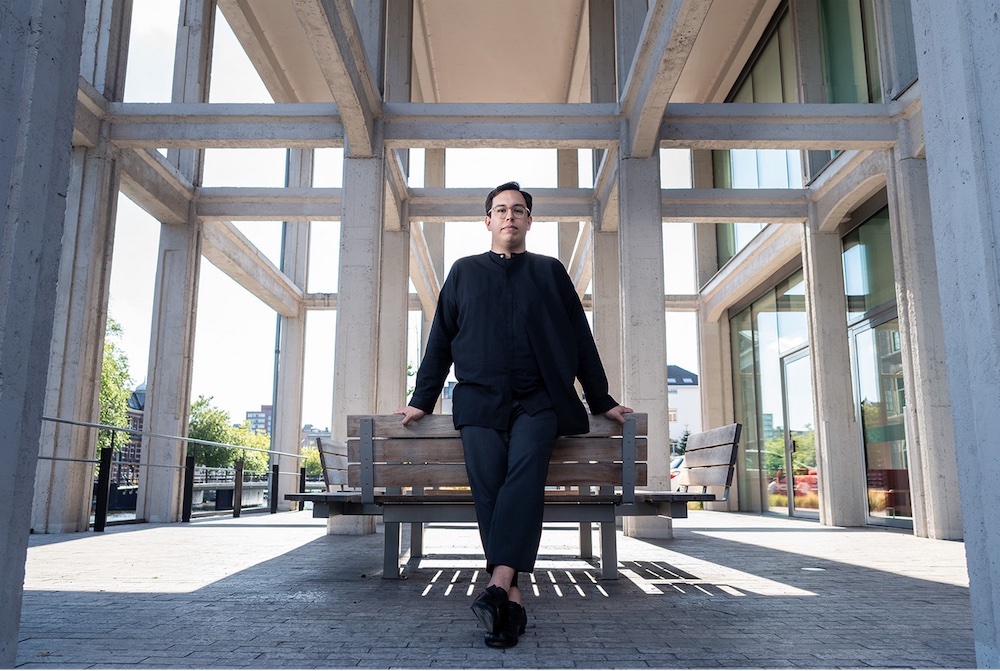When Johann Sebastian Bach’s sacred cantatas were composed in the 18th century, the congregants in his Lutheran church likely would never have imagined a Cree-Métis Two-Spirit singer performing them.
“When I sing these works, it’s actually an act of resistance,” says Montreal-based baritone Jonathon Adams of the liturgical pieces.
As part of Early Music Vancouver’s 2021 Vancouver Bach Festival, Adams will perform Cantata BWV 56 (“Gladly shall I bear the cross”) and Cantata BWV 82 (“I have enough”) alongside the Pacific Baroque Orchestra.
“It’s antithetical to the narrative around sacred music that someone like me should actually perform them,” continues Adams. For centuries, participation in sacred music and western classical music in general was largely limited to white, heterosexual men, a norm that Adams challenges with their performances in the Bach cantatas.
The festival runs July 27 to Aug. 6 and features concert films, audience recording sessions and live outdoor concerts.
And in a landmark decision among music organizations in Vancouver, Early Music Vancouver is granting free access to its concerts for all Indigenous people, starting with the Bach Festival.
Adams, who is Early Music Vancouver’s first summer artist-in-residence, came up with the idea. They say that improving access to artistic and historical experiences for Indigenous people is an important step and helps to bridge gaps between music organizations and Indigenous communities in Vancouver.
Adams has performed the classical repertoire in renowned venues around the world, including the Bruges Concertgebouw in Belgium and the Chateau de Versailles in France. The singer is a Britten-Pears Young Artist and performs regularly with the Amsterdam Baroque Orchestra & Choir.
While Adams will perform many European classical works at the Bach Festival, such as the cantatas, they are also pushing to place more Indigenous art at the centre of the arts scene in Canada — an Indigenous resurgence, as they put it.
Adams will perform Cree and Métis songs in Le Rossignol Sauvage, a concert that will be presented both as a film on July 27 and as a live concert at the UBC Botanical Garden on July 30. The songs largely feature simpler melodies and structures and are part of a tradition in which the tunes were passed orally from generation to generation.
Allusions to nature appear throughout the collection, from "Le petits oiseaux (The Little Birds)" to "La montagne sauvage (The Wild Mountain)," reflecting a bond to the land. "Le petit Rossignol Sauvage," a slow and smooth tune that dates back to the 1880s, describes a “little wild nightingale” that reminds the narrator of their lost lover.
Some of the earliest Métis songs have European origins, and share similarities with the air de cour, a vocal genre that was prominent in France during the 16th and 17th centuries. Reflecting the Métis’ multicultural heritage, these tunes include Michif, French and English lyrics.
The origins and titles of the Cree songs are less certain, an ambiguity that may be due to colonial influences. According to Lynn Whidden, a professor of Indigenous studies and music at Brandon University, many traditional Cree songs began disappearing after the Cree encountered European music.
In an article in the journal Ethnologies, Whidden notes that lyrical references to birds such as the swallow or nightingale may represent a longing for freedom from restrictions. At times, the melodies imitate the actual sounds of the birds’ singing, creating an aural metaphor that likely symbolizes desire and grief.
For Adams, these traditional tunes evoke a spiritual reconnection with their culture. Growing up, Adams was steeped in the music of the European classical tradition and didn’t encounter the Cree and Métis songs until much later.
“When I sing these songs, I feel the presence of my ancestors around me,” they say. “That’s a type of resistance and resurgence in song that is powerful.”
In Adams’ essay “Indigenous Bodies/Indigenous Stories,” they write that Canada has discouraged and banned Indigenous people from sharing their cultural traditions. But now, a transformation must occur.
“We have excelled at sharing in the practices of Eurocentric art,” they write, “but we must now prioritize our own stories and modes of storytelling.”
Certain works within the European classical repertoire may appear incompatible with the hopes of an Indigenous-centred artistic experience. The liturgical nature of sacred works and their Christian roots brings to mind the harmful role that the church has played in colonization.
While Adams acknowledges the pain and destruction that the church has inflicted, they believe the works can be recontextualized by placing Indigenous experience at the forefront.
For example, the final aria of Cantata BWV 82 opens with the lines, “I look forward to my death, ah, would that it were already here.” To 18th-century audiences, these words would have evoked religious sentiments, encouraging the listeners to desire heavenly bliss and sacred communion with the divine.
But Adams adds an extra layer of meaning to these texts by reinterpreting them through a modern, Indigenous perspective. These mournful pleas touch on issues of mental health, they say, which is relevant given the mental wellness struggles of various First Nations communities.
Despite such a radical interpretation of these works, they believe that the music and the texts should not stray from their original versions composed during the 18th century.
“I don’t want to change the text or make them more user-friendly,” Adams says. “I want to perform them in an authentic way.”
The Bach Festival will also spotlight a number of female composers, such as the Venetian composer and singer Barbara Strozzi and the 17th-century nun composer Chiara Margarita Cozzolani. The concert film The City of Ladies tells the story of the medieval poet and author Christine de Pizan, who is believed to be the first person in France, male or female, to earn a living as a writer.
Including Indigenous songs and more female composers at the festival reflects an important step towards creating a new narrative.
“It’s important that we tell a whole story,” says Adams. “If we’re talking about the last 500 years of music, that is the time in which Turtle Island (North America) was colonized by Europeans. It’s important to be telling that story alongside other historical narratives.” ![]()
Read more: Indigenous, Music
















Tyee Commenting Guidelines
Comments that violate guidelines risk being deleted, and violations may result in a temporary or permanent user ban. Maintain the spirit of good conversation to stay in the discussion.
*Please note The Tyee is not a forum for spreading misinformation about COVID-19, denying its existence or minimizing its risk to public health.
Do:
Do not: